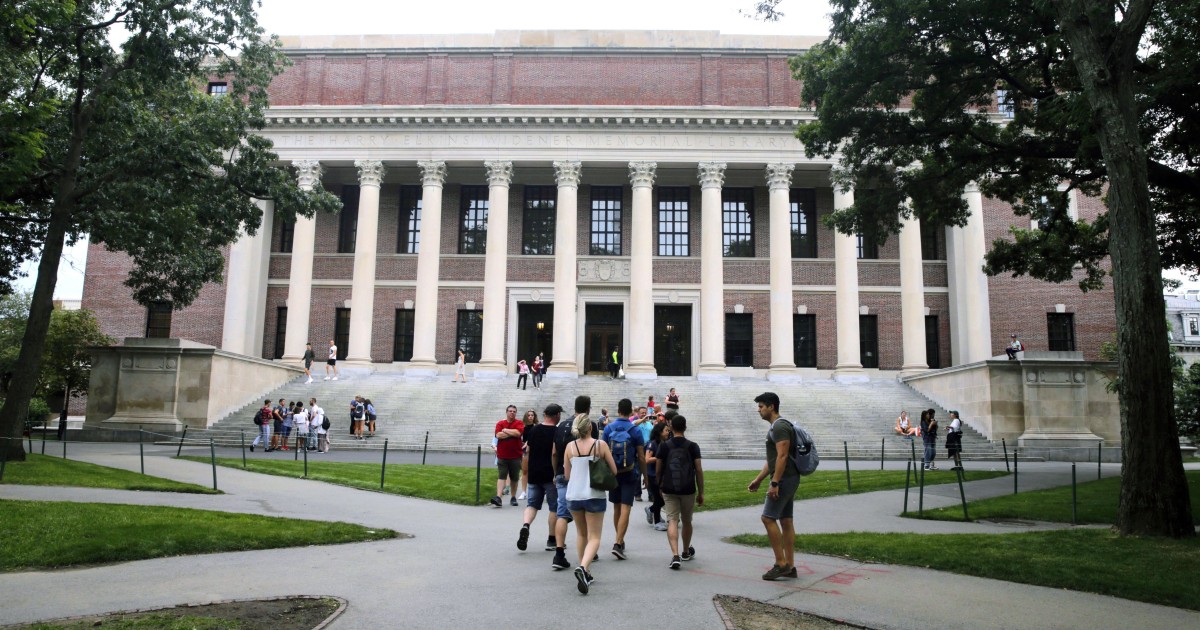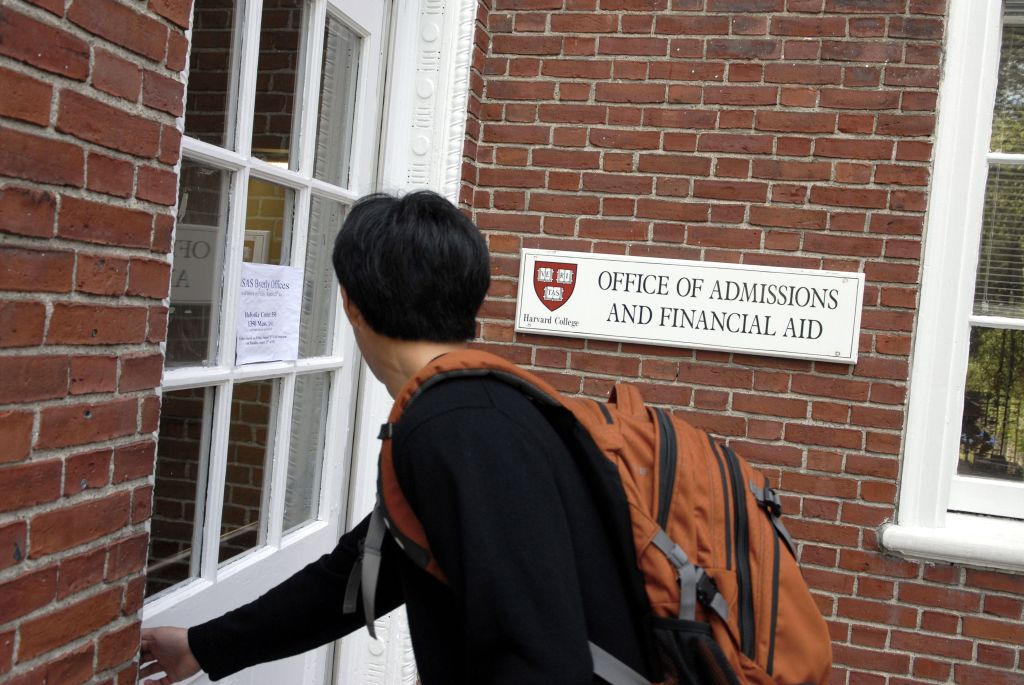- Mar 11, 2015
- 77,115
- 34,355
- 2,330
A prime example of the length and consistency of a big lie is the distortion of Affirmative Action. Whites have been given what the right complains about blacks getting since the beginning of this country. The discomfort some whites have in recognizing how they benefit from race-based law and policy is evident in any discussion a person of color has with a person who opposes equal rights legislation. Do they not understand how long whites were hired, promoted, admitted into colleges, and even allowed citizenship rights only because of the color of their skin? Do they not question the qualifications of white legacy students?
While Harvard is currently gearing up for a lawsuit around affirmative action and discriminatory admissions policies against Asian Americans, the real vector for race-based discrimination goes on unchallenged: white privilege. While white privilege operates at every level of society, the case against affirmative action cleverly hides how white privilege influences college admissions specifically. This article will answer the question what is white privilege, and will explain how it is pertinent within the discussion of affirmative action and college admissions. To conclude the article, a discussion of how our understanding of white privilege can be rectified in concrete ways to help end racial discrimination in college admissions. The central argument of this article is that white privilege affects admissions in three crucial ways: the importance placed on legacy admissions and connections, affluence-restricted athletics, and wealth.
Before we can analyze how white privilege affects admissions, it is important to examine what white privilege means. Francis E. Kendall, author of Understanding White Privilege, explains white privilege as “having greater access to power and resources than people of color [in the same situation] do”. There are two main aspects of white privilege that have been identified over the last 50 years: 1) legal and systemic advantages, or overt white privilege 2) subconscious, psychological prejudice. As Cory Collins writes in his article “What is White Privilege, Really?”, “white privilege is both unconsciously enjoyed and consciously perpetuated. It is both on the surface and deeply embedded into American life”. This dual thrust of white privilege is critical to understanding how white privilege operates both visibly and behind the scenes. While there are some overt policies that can be directly critiqued as favoring whites, the subtle ways that white privilege operates can be much harder to identify. Within the realm of college admissions, both forms of white privilege operate in equal measure.
The first way that white privilege impacts admissions is through overt admissions preference through legacy admissions. To contextualize, legacy admissions are defined as “the boost that most private colleges and universities give to the children of alumni”. The the list of schools that place weight on legacy status include: Harvard, the University of Pennsylvania, Dartmouth, Cornell, Georgetown, the University of Southern California and the University of Virginia. These students who are eligible for legacy consideration are called “legacies”, and they are “admitted at twice the rate of other applicants at some universities, and average SAT scores for legacies are, in some cases, [are] lower than the average scores of their peers”.
While legacy admissions are not overtly racialized, Richard D. Kahlenberg explains that these advantages overwhelming benefit white students: “legacy preferences disproportionately benefit white students to the detriment of AsianAmerican, African-American, and Hispanic students… only 7.6% of legacy admits in 2002 were underrepresented minorities, compared with 17.8% of all students”. To drive this point home even further, while “Asian Americans composed 15.7% of all Harvard applicant [they only represented] 3.5% of alumni children”. While legacy admissions could benefit any student who has family that attended the university, research shows that legacy admissions disproportionately benefit white students. As a result, they form one arm of white privilege’s impact on admissions. In concurrence with legacy admission, elite private universities also place a large amount of weight on the connections of a student and there family. For example, “at the University of Texas at Austin, an investigation found that recommendations from state legislators and other influential people helped underqualified students gain acceptance to the school”. These preferences thus elevate “predominantly white, affluent applicants”.

 www.nbcnews.com
www.nbcnews.com
When I walked onto campus as a freshman 29 years later, most of my Black classmates and I were still the first in our families to attend the prestigious university. We—like many lower-income students across racial and ethnic backgrounds and first-generation college students—could not benefit from the legacy preference that was extended to our white, wealthier peers—a privilege bestowed upon applicants whose parents or grandparents are alum of the school.
While the United States Supreme Court prepares to decide whether race-based affirmative action should persist, legacy admissions—essentially “affirmative action” for wealthy and white students—remain untouched.
It’s time to demand colleges and universities end the unfair, unjust, and unearned privilege of legacy admissions that has excluded students of color and low-income students for decades.
Among the top 30 universities, legacy students have a 45% greater chance of being admitted than non-legacy students and fill between 10% and 25% of all available slots in an incoming class

 newsone.com
newsone.com
While Harvard is currently gearing up for a lawsuit around affirmative action and discriminatory admissions policies against Asian Americans, the real vector for race-based discrimination goes on unchallenged: white privilege. While white privilege operates at every level of society, the case against affirmative action cleverly hides how white privilege influences college admissions specifically. This article will answer the question what is white privilege, and will explain how it is pertinent within the discussion of affirmative action and college admissions. To conclude the article, a discussion of how our understanding of white privilege can be rectified in concrete ways to help end racial discrimination in college admissions. The central argument of this article is that white privilege affects admissions in three crucial ways: the importance placed on legacy admissions and connections, affluence-restricted athletics, and wealth.
Before we can analyze how white privilege affects admissions, it is important to examine what white privilege means. Francis E. Kendall, author of Understanding White Privilege, explains white privilege as “having greater access to power and resources than people of color [in the same situation] do”. There are two main aspects of white privilege that have been identified over the last 50 years: 1) legal and systemic advantages, or overt white privilege 2) subconscious, psychological prejudice. As Cory Collins writes in his article “What is White Privilege, Really?”, “white privilege is both unconsciously enjoyed and consciously perpetuated. It is both on the surface and deeply embedded into American life”. This dual thrust of white privilege is critical to understanding how white privilege operates both visibly and behind the scenes. While there are some overt policies that can be directly critiqued as favoring whites, the subtle ways that white privilege operates can be much harder to identify. Within the realm of college admissions, both forms of white privilege operate in equal measure.
The first way that white privilege impacts admissions is through overt admissions preference through legacy admissions. To contextualize, legacy admissions are defined as “the boost that most private colleges and universities give to the children of alumni”. The the list of schools that place weight on legacy status include: Harvard, the University of Pennsylvania, Dartmouth, Cornell, Georgetown, the University of Southern California and the University of Virginia. These students who are eligible for legacy consideration are called “legacies”, and they are “admitted at twice the rate of other applicants at some universities, and average SAT scores for legacies are, in some cases, [are] lower than the average scores of their peers”.
While legacy admissions are not overtly racialized, Richard D. Kahlenberg explains that these advantages overwhelming benefit white students: “legacy preferences disproportionately benefit white students to the detriment of AsianAmerican, African-American, and Hispanic students… only 7.6% of legacy admits in 2002 were underrepresented minorities, compared with 17.8% of all students”. To drive this point home even further, while “Asian Americans composed 15.7% of all Harvard applicant [they only represented] 3.5% of alumni children”. While legacy admissions could benefit any student who has family that attended the university, research shows that legacy admissions disproportionately benefit white students. As a result, they form one arm of white privilege’s impact on admissions. In concurrence with legacy admission, elite private universities also place a large amount of weight on the connections of a student and there family. For example, “at the University of Texas at Austin, an investigation found that recommendations from state legislators and other influential people helped underqualified students gain acceptance to the school”. These preferences thus elevate “predominantly white, affluent applicants”.

Study finds 43 percent of Harvard's white students are legacy, athletes, related to donors or staff
The number drops dramatically for black, Latino and Asian American students with less than 16 percent each coming from those categories, the study said.
‘Affirmative Action’ For Wealthy, White Students: Why Colleges’ Legacy Admissions Must End Now
In 1963, Duke University admitted its first five Black undergraduates.When I walked onto campus as a freshman 29 years later, most of my Black classmates and I were still the first in our families to attend the prestigious university. We—like many lower-income students across racial and ethnic backgrounds and first-generation college students—could not benefit from the legacy preference that was extended to our white, wealthier peers—a privilege bestowed upon applicants whose parents or grandparents are alum of the school.
While the United States Supreme Court prepares to decide whether race-based affirmative action should persist, legacy admissions—essentially “affirmative action” for wealthy and white students—remain untouched.
It’s time to demand colleges and universities end the unfair, unjust, and unearned privilege of legacy admissions that has excluded students of color and low-income students for decades.
Among the top 30 universities, legacy students have a 45% greater chance of being admitted than non-legacy students and fill between 10% and 25% of all available slots in an incoming class

'Affirmative Action' For Wealthy, White Students: Why Colleges' Legacy Admissions Must End Now
While the U.S. Supreme Court prepares to decide whether race-based affirmative action should persist, legacy admissions—essentially “affirmative action” for wealthy and white students that's excluded students of color and low-income students for decades—remain untouched.
 newsone.com
newsone.com

